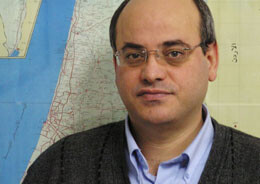The Electronic Intifada 3 February 2010

Mohammad Zeidan (Arab Association for Human Rights)
Adri Nieuwhof: Can you discuss HRA’s work and what drives you?
Mohammad Zeidan: HRA is active in three fields: human rights education linked to community outreach; research and reporting on violations of human rights of Palestinians living in Israel; and international advocacy to bring the needs of our community to international attention. Without international attention Israel will not change its policies toward its Palestinian minority. I am driven by the feeling that there is a need for community action against racial discrimination in all aspects of Palestinian life in Israel. With human rights education we help our communities to know their rights and the protection of their rights.
AN: What are the major challenges concerning the rights of Palestinians in Israel ?
MZ: For the Palestinian minority, [chief concerns include] the rise of the culture of racism among the majority of Israeli society, the public support for racist ideas — for instance the transfer of the Palestinian population from Israel. [Also of concern are] proposals for new laws that restrict basic minority rights, like organizing politically and the use of our land. And it is a challenge, how can we link our issues to the broader problems of Palestinians fighting the occupation [in the West Bank and Gaza Strip]. I think in our community we are faced with the challenge to mobilize the young generation for political action. They are the future leaders. It is important they become aware of their identity, linked with the Palestinian Arab international community.
AN: Do you think the situation of Palestinians in Israel has improved over the past ten years?
MZ: There is no sign of improvement. All the change is backwards. The situation is deteriorating. We are winning small victories, but the challenges are becoming bigger. [Israeli] racism is growing. Since 1977 you can see Israeli support for the right wing is growing. Take for example the support for [Avigdor] Lieberman. The left wing is disappearing.
AN: Does HRA have allies in Israel and abroad?
MZ: The Palestinian minority in Israel is our ally. And we have allies among [Jewish] Israelis, people who are concerned about human rights issues. We challenge the Jewish character of the State of Israel, and this makes it hard for Israelis to support our work. They can support specific action. Internationally we have much better allies. We saw a rise in support abroad, especially after the war in Gaza, even in the United States. The international support is not reflected as the political level. There is a gap between the popular support and the government.
AN: Palestinian human rights defenders in the occupied West Bank are confronted with a wave of repression. How is the situation in Israel?
MZ: There is also oppression in Israel. Nongovernmental organizations have been shut down by administrative order, but not at the scale as in the Occupied Palestinian Territories (OPT). Israel is not interested to put [itself] on the agenda [by bringing attention to human rights violations within its borders]. They don’t want to open another front. Getting international support gives us a kind of protection. It makes it harder for Israel to deal with us the way they deal with Palestinians in the OPT.
AN: Have the closure of Gaza and Israel’s attack on the territory last winter had an impact on the Palestinian community in Israel?
MZ: In principle the Palestinians in Israel, like most Palestinians, reacted to Gaza. The biggest demonstration in Israel ever was organized in Sakhnin in the Galilee [region in northern Israel] in December 2008. Over 100,000 people participated in a demonstration against the military attacks on Gaza. It was the first time we came out in such big numbers. In general the war made the issue of the oppression much stronger. This is strengthening our identity. We feel more and more that we are part of the Palestinian people, a process that already began before the war.
AN: What is your advice to Palestine solidarity activists and citizens abroad?
MZ: I would say that for Palestinian activists the main issue is the unity of all the Palestinians. We should work together, and mobilize all powers. And we have to rethink our strategy. Sixty years of promoting the two-state solution did not get us anywhere. The facts on the ground have made this impossible. We need a new, united strategy as one people, that takes all of us into consideration — regardless of our political affiliation or geographic distribution.
On the role of Europe and the international community I would like to say that the public support needs to be translated to political action. This is not happening right now. On the contrary, Israel is receiving more support from the European Union (EU) with talks about the upgrading of the relationship between the EU and Israel, and with Europe’s refusal to hold Israel to account by withholding support to the Goldstone report. It has an impact on the credibility of the EU and its member states as democratic states.
Adri Nieuwhof is an independent consultant based in Switzerland.





